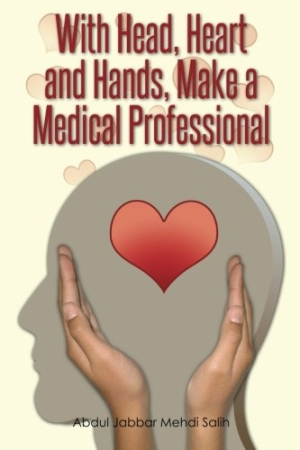It looks like you've stumbled upon a page meant to be read by our code instead of viewed directly. You're probably looking for this page.
With Head, Heart and Hands, Make a Medical Professional
Salih draws from his years of medical experience to share the virtues he believes bolster the study of medicine.
We will all be patients at some point in our lives, surrendering ourselves to someone else’s medical expertise. Abdul Jabbar Mehdi Salih, head of the Academic Department of Surgery in the Dubai Medical College for the last twenty-five years, hopes to strengthen that intense relationship between patients and doctors in With Head, Heart and Hands, Make a Medical Professional.
Salih has compiled decades of his experience to argue that medical training should include the virtues of altruism, respect, honesty, integrity, dutifulness, honor, excellence, and accountability. These attributes, he writes, are “the means by which individual doctors fulfil [sic] the medical profession’s contract with society.” Without faith in this contract, he argues, “healing is impaired.”
For Salih, medicine is a “complex and artful sociobiological practice.” In hopes of steering medical professionalism toward synergy and balance, he has divided his book into chapters titled “The Head,” “The Heart,” and “The Hand,” with a final chapter titled “The Head, the Heart and the Hand.” He spends the most text on “The Head,” where he discusses the importance of communication, ethics, and morality alongside doctors’ solid undergraduate foundation in the hard sciences.
Here, Salih provides concrete classroom techniques for improving communication skills, such as providing feedback or a videotaped replay of a student’s patient interview. He also illustrates the central role ethics plays when a doctor is faced with, for example, how far medical intervention should go when saving an Alzheimer’s patient’s life.
These specifics stand out because, for the most part, Salih’s text is more focused on the bigger picture of refining medical professionalism. In addition, he consistently uses passive voice, which waters down the authority of his message that doctors can drastically improve their medical efficacy by exercising their hearts as well as their heads.
Likewise, Salih cautions against treating illness as merely something to be clinically solved. Instead, he promotes “teaching ways of explicitly attending to the patient’s experience and to the social or organizational as well as biological context of the case.” Specific pedagogy or case examples could have gone a long way toward furthering his argument.
Perhaps Salih withholds specifics because he believes medical professionalism is forever changing to keep up with the times. “The professionalism of yesteryear,” he writes, “has difficultly in coping with contemporary funding and regulatory mechanisms and with a society that has also changed profoundly.” As health care systems and communities evolve, Salih emphasizes that professionalism, what he calls the “‘soul’ of the practice of medicine,” needs to be kept intact.
Reviewed by
Amanda McCorquodale
Disclosure: This article is not an endorsement, but a review. The publisher of this book provided free copies of the book and paid a small fee to have their book reviewed by a professional reviewer. Foreword Reviews and Clarion Reviews make no guarantee that the publisher will receive a positive review. Foreword Magazine, Inc. is disclosing this in accordance with the Federal Trade Commission’s 16 CFR, Part 255.
